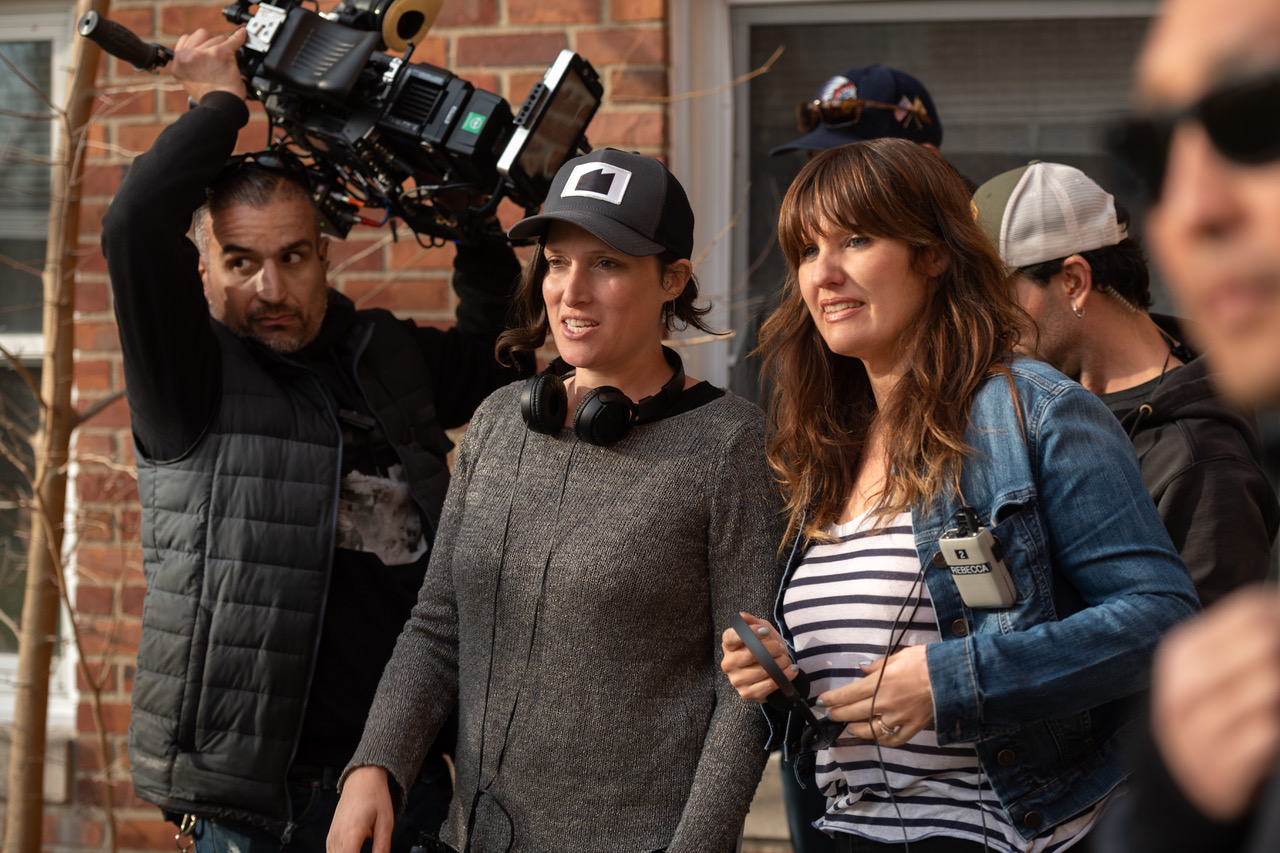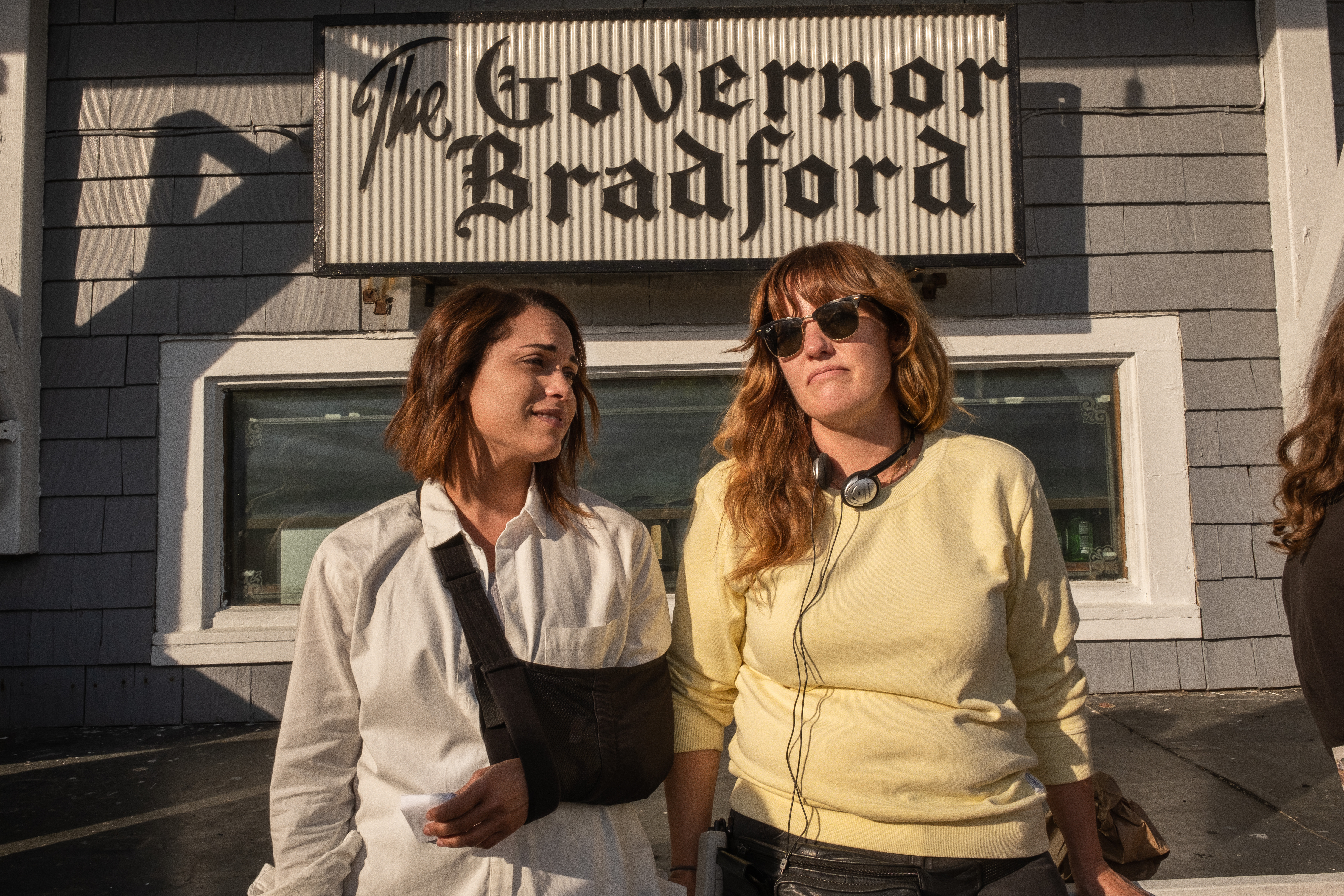
- Interviews
Rebecca Cutter – Creating Real People on ‘Hightown’
What happens when a woman writes a crime drama? You get the crime, you get the drama, and you get a little something more – characters who aren’t cookie-cutter. Rebecca Cutter, creator, director, executive producer, and writer of Starz’s Hightown, ratchets up mystery against the backdrop of America’s opioid epidemic. Cutter got the break many white males have been getting for decades, the opportunity to helm a series guiding all creative aspects when her spec script caught the eye of Jerry Bruckheimer. “Men have been getting to write women for millennia,” she says now. “Because female characters have been limited for so long there’s something really fun about getting to write men.” Before her turn as showrunner, a partial list of her credits include Gotham, Code Black, and The Mentalist. The protagonist of Hightown is a gay woman, Monica Raymund (Chicago Fire), dealing with lust, death, and addiction.

What piqued your interest in writing?
My mother was a social worker. I used to eavesdrop on the sessions and became interested in people, their stories, telling intimate details of people’s lives. You see a lot of that in Hightown. That interest in, connecting with, and understanding people, is key in how you run a writer’s room; how to get the best work out of people.
How did you get your start?
I moved to LA to go to USC Film School to be a writer/director. I’ve had a career in this industry for many years. l did all of the jobs. “I was a post-PA, a set PA, I worked in reality TV, I worked in features. My first paying job was a freelance coverage writer. You quickly learn what you like and to assess other’s writing. Ultimately, I was an assistant to a showrunner which was my entrée into scripted television.
Each time you took the next rung up the ladder, did you ask for the next level?
I’m very typically a female. I don’t advocate for myself as hard as I should; it’s difficult to ask. I remember when I was switching jobs, I was negotiating a salary. I asked for a $50 raise and showed the letter to a friend, who rewrote it with a new number. I said, ‘You can’t ask for a number like that!’ Looking back, it was nothing. He wrote back in five minutes. I got the raise, and I went, “Oh, I get it.”
How did you create the show?
The themes were things I’d worked on in other pieces. Addiction and recovery are important to me, (as is) female sexuality, this idea of a woman trying to save herself through solving a crime or going on a journey with a mystery. But the spark was the character of Jackie, she came to me in a flash. My father-in-law was a Fishery’s Service Agent in Cape Cod. I knew Provincetown. I’ve been going there my whole life. Jackie is a year-rounder, very tough with this specific job, a party girl reaching the end of the party. I saw her and knew that was a character I wanted to write. Everything blossomed from there.
Let’s talk about breaking stereotypes. How easy was this story accepted? Did you have to fight for the character of Jackie?
I wrote it on spec on my own. I’m sure there were plenty of people who didn’t like it but when KristieAnne Reed of Jerry Bruckheimer’s JBTV read it, she said she stood on her chair and said, ‘We have to make this.’ Starz felt the same way. I’ve made the mistake of reading all the comments – the people who love it, love it, but there are people that it’s not for them. There’s too much sex, or it’s so lesbian. (She shrugs.) That’s okay, it’s not for you. But if you recognize yourself in it, wonderful. I relate to the darker more flawed side of life. I was very much like Jackie in my 20s, just plowing through people selfishly. Ray (the cop) has some of that. Everyone has an agenda, nobody is just one thing, you can be selfish and wanting to help someone; these coexist – there’s a lot more ‘and’ than ‘either, or’. The idea that Jackie sleeps around and is scared of intimacy so most of her close relationships are with men, which is less scary and less intimate, leads to a much richer portrayal of people. Ray is a terrible cop but he also believes he is doing the right thing. You can see both simultaneously. As an audience, you enjoy the richness of that.
Why did you choose to write about opioid addiction in America?
I’m from Massachusetts, my husband from Cape Cod. Sort of randomly I started hearing about the opioid crisis. It was happening all over the country by the time I started hearing about it, but because I happen to have relatives in Cape Cod, and one who works in a hospital, I was hearing about a whole culture starting to change. My husband started telling me the kids he went to high school with were dying. Property-crime was going up. Babies (were) being born addicted. I think that was in the back of my mind. Cape Cod is a place I love, so when I started to write, all these elements were already there. I have always written crime. I wanted to write the narcotics thing, kind of an ode to The Wire.
You write complicated women, but you write complicated men too.
I love writing men probably because female characters have been limited for so long. Men have been getting to write us for millennia so there’s something really fun about getting to write men. It’s sort of why I love writing Jackie. I love the humor, I call it ball-breaking, that real tough-guy banter, it’s so fun to me. I wanted every character to have an interior life. Frankie is a bad guy, but he has a reason for why he’s doing what he’s doing.
Given it’s usually men who have been executive producers why did you pursue this field?
I’m not a hustler, I’m not sure I pursued it. I pursued writing, being on staff. I never envisaged this would be on television. I certainly didn’t imagine myself running a show. My agents, two women, said, ‘We can sell this’. It was their belief in me that made this happen. In my life a lot of times, my vision for myself is limited. I need to surround myself with people who see a bigger possibility. I’m lucky Jerry Bruckheimer Television saw a bigger possibility, that STARZ did too. I should not listen to my own head.
Since you don’t see yourself as being the driver, why are you successful?
I do see myself as the driver now. This was four years ago, it’s a process. I’ve grown into the role. When they gave me the writer’s room they said, ‘Can you run this room?’ Of course, I said, ‘Yes.’ But I didn’t know if I was up to it because I had only staffed on three shows before, but it went great. I could feel it was going great. I knew they were happy with the scripts; so was I. You learn what you’re capable of on the job. What I learned is it’s your vision. It is not arrogant, or unseemly to insist that people try to fulfill your vision. That is my job. To succinctly explain to people what I am looking for and have them deliver that to me. That is how I serve the project. I’m all for collaboration. I love it. People bring so much, there’s so many other elements, writers, directors, crew, but ultimately, it has to match what the original spark was about, what was important to me. It’s a process, learning that role, but I think I’ve done it.
What is your leadership style?
People perform best when they feel safe. I don’t mean physically although that is part of it. I’ve been on staff and been yelled at or you can be in trouble. That is not the best method for creativity. Everyone has to feel their ideas are heard, that they are in a safe place to share. I’ve done my best to do that. It has to be fun. I’m talking specifically about the writer’s room, it has to be fun, it has to be people you want to be with, there’s a family element to it. There’s no reason to be there at 10 pm. I don’t understand how shows do that. We all have families to get home to. If you take care of people, they want to perform the best for you. I’ve been on the staff of other peoples’ shows where the job is to follow their vision and to serve this show and it’s not about me. Sometimes that’s not a good fit. You feel you are not contributing to the level that you could or should be able to. That feels bad, but as you get older and hopefully (acquire) healthier self-esteem, you learn other people’s opinions are not my business. There are going to be jobs where you feel like a star and somewhere you feel like you are constantly measuring up. Your job is to know in your soul what skills you have and deliver that and trying to find places to shine and leave the rest behind.
Can a woman earn equally and juggle family, because you can’t always afford daycare?
It’s hard. I have two daughters. You can have a career and have kids. You can technically have it all, but this is especially true of women, you’ll always feel that you are shorting one side. When I’m with my kids I worry about work, at work I worry about my kids. I’ve never felt I have enough hours in the day and it’s true that you don’t. It does fall disproportionately on women. One good thing from Covid-19 is a rebalancing of work and life, and an understanding we can do our jobs and still have time at home. I don’t understand the need to work until 10 pm. It’s not sustainable, it’s not healthy, it’s not good for the family. We have to start realizing that what’s good for moms and good for families, can also be good for the industry, and we need to find the way.

